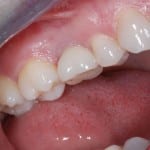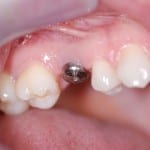Dental implants from Clover House Dental Practice Harrogate
Dental implants are a permanent way of replacing missing teeth.
They are versatile and can hold a crown, bridge or denture in place just like roots hold natural teeth. We consider dental implants to be one of the greatest leaps forward in dentistry and they are as close to natural teeth as we can get with the current available technology. Unlike a traditional denture or bridge, dental implants are actually anchored into your jaw. This means that adjacent teeth are not affected. Once in place, the crown, bridge or denture is then attached to give the final outcome.
This provides much greater support and allows for more effective eating, speaking and smiling. The technology behind dental implants has been researched extensively over the past 40 years and you can be reassured that we are able to achieve very predictable outcomes.
Dental Implants
The most common fear for most of us is the dentist. But it’s a fear that should not be there especially when we understand the dentist is here to help us. If you are missing a tooth dental implants UK will find and diagnose common restoration treatment for you. The North Yorkshire dentist will be able to give you a consultation for your care.
When you visit Harrogate Dentist at Clover House you will receive all information about Dental Implants. The dentist will diagnose you, and explain the treatment you need. What are Implants? An Implant is a device used to replace the roots of your missing teeth. Dental Implants support crowns, bridges or dentures. They are placed in by surgery. There is a natural feel for most that use implants verses dentures. The Clover House Dental Surgeons at North Yorkshire England will calm are you fear’s.
There are many reasons to have teeth implants.
• To be more self confident.
• To be able to Chew.
• Before the Jawbone erode.
• The Feel
Clover House North Yorkshire Dentist has different types of Implants.
• Most common Root Form made of Titanium.
• Blade Form
• Ramus Frame
• Transosseous
All Teeth Implants are successful by a process called osseointegration. This is a bonding with the jaw bone and the teeth implant.
Are you looking to replace a tooth? If so Dental Implants may be for you. If you’re in good health and have healthy gums and enough bone to secure the dental implant. The Clover House Harrogate Dentist and Clover House Dental Surgeon North Yorkshire England and North Yorkshire Dentist will evaluate you to see if you’re a good candidate for teeth implants.
There will be a team to make sure everything you need is covered. Harrogate Dentist is there to help you in every way. Everything you need under one roof at Clover House. Dental Implants UK offer Teeth Implants. We give excellent care to all patients. Available for our patients are great Dentist and Surgeon or a Periodontist for the teeth Implants, and Restorative Dentist. So make an appointment here at Clover House. We will set up an evaluation for you. We will schedule you to meet with our complete Clover House Dental Implant team. You will receive all options available to you. Procedure will be discussed. We will work close with you to develop a treatment plan design for you with your preferences.
What is a Dental Implant?
A dental Implant is an artificial substitute or replacement for the root part of a tooth. This implant is then anchored into a pre-drilled socket into your jaw-bone to support either a crown, bridge, or to secure a denture firmly into its place. The implant looks like a small metal post which is a cylinder in shape. This implant is made from Titanium, as this material works well with bone and is easily integrated with bone tissue, without any risk of rejection or inflammation. Although Titanium is the most popular, other materials can be used, such as titanium alloy, stainless steel and zirconium.
When your implant takes place, the main goal is that the jawbone and the bone fuse together, in what is called ‘osseointegration’. When this process has happened a replacement tooth called a restoration can be fitted to it via a small attachment. These implants can be fitted into your upper or lower jaw and they can hold several teeth in place at once.
There are two different types of Dental Implant.
* Subperiosteal
* Endosteal (‘Root Form’)
The Subperiosteal implant takes the form of a metal framework to which is placed just underneath the gums. The framework has small metal posts which protrude through the gums, these enable the attachment of replacement teeth. And so because of this, the Subperiosteal is less commonly used.The Endosteal or as it is commonly called ‘Root Form’, is the most popular type of implant as this is inserted into the jawbone.
Are there any Exclusions to the procedure?
Yes, there are some exclusions to being allowed to go through with this procedure.
* Smoking: if you are a heavy smoker then your dentist will advise you to put this on hold or stop altogether. The reason being as this slows down the healing process.
* Alcohol: the same applies here. Excessive alcohol intake can affect the healing of the gums.
* Bruxism: also known as ‘teeth grinding’. If you have a tendency to grind your teeth then your dentist will give you a ‘splint’ which can be worn at night. This will prevent further damage to your teeth.
* Pregnancy or breastfeeding
* Diabetes or hypertension (high blood pressure)
* Under 19: dentists do not usually treat patients who are under 19, as they prefer to wait until the jawbone has fully grown before considering an implant.
How does the Dental Implant process work?
Before you can have a Dental Implant, your dentist will first assess the heath or your teeth and gums. If there are any signs of gum disease or decay, these must first be treated. Upon a successful assessment of your teeth and gums, a series of several x-rays or in some cases a CT Scan to assess the bone quality and to check for any anatomical structures to avoid before any drilling. These also assess your bone density and volume to make sure that there is enough bone to allow the implant.
The entire procedure is done under a local anaesthesia, or IV sedation if it is a long procedure, or if the patient is very nervous.
When the procedure starts, the gum where the implant is to be placed is cut, then a small hole is drilled into the jawbone at a very precise location of where the implant is to be placed. The implant is then tightly fitted into the socket and then the gum is stitched back over this Titanium implant. In some cases a bone graft may be required if there is insufficient bone material to accommodate this implant.
When the implant is fixed into place, it is then left to heal and integrate with the jawbone for roughly six weeks to six months. The bone tissue will then grow and anchor itself into the microscopic rough surface of the implant.
During this, as so named, ‘Healing Period’, patients are given temporary teeth (bridges) or they can continue to wear dentures. It is very important that the temporary teeth do not put any force on the healing implant in the gum. After this healing period, the gum is lifted again and a post is attached to the implant along with a temporary crown. Following this, four to six weeks later, when the surrounding gum of the implant is ‘matured’, the final restoration can be fitted to the implant.
What are the Advantages of Dental Implants?
Rather then dentures or bridges.
* Reduced Bone Loss
* Improved Function
* Improved Dental Hygiene
* No need to drill or remove any healthy tooth structure.
* Better Anaesthetics
* Easy to clean – Just like natural teeth.
* Fit in well with your natural teeth
There is a very high success rate, to which is currently around 90 to 95% on average. These figures to vary according to which area of the mouth is being treated. The upper jaw is more difficult to fix in an implant then that of the lower jaw. Implants in the upper jaw have the success rate of 90 to 95% and the lower jaw a success rate of 98%.The back part of the mouth, both upper and lower have success rates of 85 to 95%, this however is still high.
The front section of the lower jaw is rated at 98%.
What are the risks of Dental Implants?
* Implant Failure
* Infection
* Inflammation of the gums
* Fractured or broken implants
* Poor Positioning
* Overloading (too much force ensued)
* Damaged Sinus tissue
What if there is not enough bone for the dental implants?
There are some alternatives if there is not enough bone for the Endosteal procedure. These alternatives include dentures and bridges. However there are various bone grafting and tissue regeneration procedures that can be carried out with dental implant
Sinus Augmentation
In this procedure, if you need to replace any missing teeth at the back of the upper jaw, a sinus augmentation, to which a new bone in the sinus is created, can increase the height of bone available for the placement of the implants in this area.
Onlay Grafting
This procedure is where a piece of bone is taken from somewhere else and that is secured over an area that is deficient in bone. Over time, the newly placed bone will fuse with the underlying bone. Therefore creating a better environment for an implant to be placed in the future.
The bone for this grafting can be taken from anywhere in your body, mainly from your chin, the back of the lower jaw, the hip or the tibia. The reason the bone is taken from your own body as it is the most viable and has a faster healing time. In some cases a combination of artificial and your own natural bone is used. In any bone grafting procedure, the grafted bone provides and anchor and stimulus for the existing bone to grow onto. This then eventually providing a suitable environment for the placement of implants.
Do Dental Implants hurt?
The procedure itself is relatively painless, however you may experience pain or discomfort afterwards. In the procedure you will be given a local anaesthetic to help numb the area, this will then take a few hours to wear off.
After the procedure you will find that your gums are tender and swollen and that your jaw aches, taking painkillers will help ease this. Any discomfort or pain will slowly ease in the first week following treatment.
How long do Dental Implants last?
The Dental Implants can last a lifetime depending on how well you look after them. Like any other restoration, your implant supported teeth can still be damaged by trauma and they can still be affected by gum disease and poor oral hygiene.
How much does a dental Implant cost?
These implants vary considerably as it depends on several factors. The level of skill of the surgeon doing the operation, the type/quality/brand of the implant being used, the clinic to where the treatment is being carried out, the level of aftercare service provided, the amount of work required in the bone grafting, and the number of implants required.
In the UK, the cost of a single tooth implant can vary from £800 up to £3,000.


